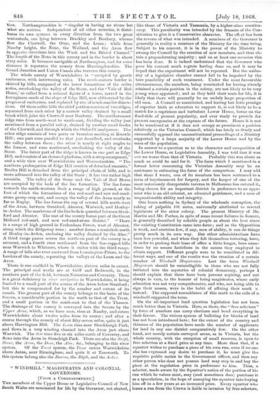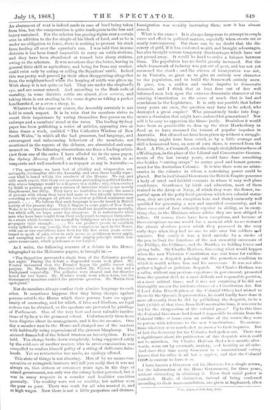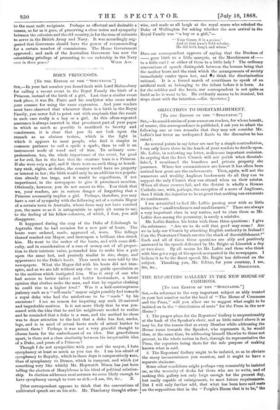" WINDMILL " MAGISTRATES AND COLONIAL GOVERNORS.
[FROM A CORRESPONDENT.]
THE members of the Upper House or Legislative Council of New South Wales are nominated for life by the Governor, not elected, like those of Victoria and Tasmania, by a higher-class constitu- ency. This peculiarity was intended by the framers of the Con- stitution to give it a Conservative character. The effect has been the reverse of what was intended. A nominee of the Governor is generally in reality a nominee of the Ministry for the time being. Subject to his consent, it is in the power of the Ministry to swamp the Council by the creation of new members, and thus ob- tain a preponderating majority ; and on at least one occasion this has been done. It is indeed understood that the Governor who
gave his consent much regrets having done so, and it may be hoped that the experiment will not be repeated. But the autho- rity of a legislative chamber cannot fail to be impaired by the bare possibility of such treatment. Under the most favourable circumstances, the members, being nominated for having already attained a certain position in the colony, are not likely to be very young when appointed ; and as they hold their seats for life, it is likely that there will generally be an unduly large proportion of old men. A Council so constituted, and having but little prestige of superior birth or education to support it, is not likely to be a. match for a capricious and turbulent Lower House, borne on the flood-tide of present popularity, and ever ready to provide for present emergencies at the expense of the future. Hence it is not to be wondered at if it does not occupy so prominent a position relatively as the Victorian Council, which has lately so firmly and successfully opposed the unconstitutional proceedings of a Ministry supported by a large majority of the Lower House and by the mass of the population.
In answer to a question as to the character and composition of the Lower House, or Legislative Assembly, I was told that it was now no worse than that of Victoria. Probably this was about as much as could be said for it. The facts which I mentioned in a former letter concerning the Victorian Assembly may be an assistance in estimating the force of the comparison. I may add that since I wrote, one of its members has been sentenced to a term of imprisonment for forgery, and the keeper of one of the most notoriously disreputable taverns in Melbourne has entered it,. being chosen for an important district in preference to an oppo- nent who is an old colonist, an educated gentleman, and a man of unquestionable ability and integrity.
One hears nothing in Sydney of the wholesale corruption, the taking of palpable 10/. notes, universally attributed to several legislators of the sister colony. The present Ministry of Mr.
Martin and Mr. Parkes, in spite of some recent failures in finance, is generally described by reliable people as about the best since the existing Constitution came into force ; and as the Opposition is weak, and contains few, if any, men of ability, it can do things pretty much in its own way. But other administrations have been less powerful, and when they felt themselves tottering, have, in order to prolong their lease of office a little longer, been some- times by no means fastidious in the means they employed to obtain support. Different people were to be conciliated in dif-
ferent ways, and one of the results was the creation of a certain number of Windmill Magistrates. Lest the term Windmill Magistrate should be unintelligible to those who are not fully
initiated into the mysteries of colonial democracy, perhaps I should explain that there have been persons aspiring, and not always in vain, to the honour of being magistrates, whose early education was not very comprehensive, and who, not being able to sign their names, were in the habit of affixing their mark x. instead. The supposed resemblance of this mark to the sails of a. windmill suggested the term.
On the all-important land question legislation has not bean much better than in Victoria. Here, as there, the "free selectors" by force of numbers can carry elections and bend everything in their favour. The vicious system of balloting for blocks of land has not been introduced here ; for the extent of the country and thinness of the population have made the number of applicants
for land in any one district comparatively few. On the other band, not merely certain surveyed areas, as in Victoria, but the whole country, with the exception of small reserves, is open. to. free selection at a fixed price at any time. More than that, if a squatter wishes to purchase a piece of his own rep, even if no one else has expressed any desire to purchase it, he must give the requisite public notice to the Government officer, and then any other person who does not possess land may step in and buy the piece at the regulation price in preference to him. Thus, a selector, made aware by the Squatter's notice of the portion of his run which he values most, may (and sometimes does) purchase.is as a speculation, in the hope of annoying the squatter into buying him off in a few years at an increased price. Every squatter who leases a ran from the Crown is liable to invasion by free selectors_
An abatement of rent is indeed made in case of land being taken from him, but the compensation is quite inadequate to the loss and injury sustained. For the selector has grazing rights over a certain area in addition to the fee simple of his block of land, and as he is under no obligation to fence, there is nothing to prevent his stock from feeding all over the squatter's run. I was told that in some districts it has been found impossible to carry on cattle stations, and they have been abandoned or turned into sheep stations, owing to the selectors. It was notorious that the latter, having in general little skill in agriculture, and being far from any market, could exist only by eating or selling the Squatters' cattle. Indeed this was pretty well proveqy their often disappearing altogether from the neighbourhood when the keeping of cattle was given up.
With sheep it is not quite so bad. They are under the shepherd's eye, and are sooner missed. And according to the Bush code of morality, in some districts cattle are almost fcrx nohow, and taking them is not stealing in the same degree as taking a pocket handkerchief, or a even a sheep, is.
Whatever be the cause or causes, the Assembly certainly is not held in much respect. It is in vain that its members strive to assert their importance by voting themselves free passes on the railways and a members' stand at the races. The leading Sydney paper has been publishing a series of articles, appearing two or three times a week, entitled "The Collective Wisdom of New South Wales," in which all the bad grammar, bad language, and extravagant and unbecoming behaviour of the members, not mentioned in the reports of the debates, are chronicled and com- mented on. The following observations are from a leading article (not from one of the series I have alluded to) in the same paper, the Sydney Morning Herald, of October 1, 1867, which is as temperate and well conducted a newspaper as any in Australia :—
" The specimens we have had of ribaldry and vituperation are, unhappily, too familiar with the Assembly, and even these hardly repre- sent what is hoard within the precincts of the Houses. We say, and with much regret, that there are members pretending to political leader- ship whose language would be a disgrace to a stable; who, when excited by drink or passion, pour out a stream of invective which is not merely blasphemous, but filthy. They have no hesitation to couple tho names of persons with whom they have had more or less friendly intercourse, according as the changes of private interest or political sentiment may
permit Wo believe that such language is rarely hoard in British society of the present day. That it lingers in some parts of New South Wales is to be traced to causes which we shall not describe more specially, but which will, we hope, some day disappear. It is unfortunate when men who have been taught from their early youth to express themselves in a strain which becomes too natural by indulgence are in a position to propagate their example We can produeo proofs to establish every syllable we say, namely, that the conspicuous men in the House, with one or two exceptions, have been for the last seven years accus- tomed to speak of each other in such terms as gentlemen never apply, and excepting under the power of that mighty principle which con- quers resentment, which gentlemen never forgive."
As I write, the following account of a debate in the House, telegraphed to the Melbourne papers, is brought in :—
" The Opposition prevented a single item of the Estimates passing last night. During the debate a disgraceful scene took place. Mr. Forster insinuated that the Premier began his public career with perjury. Mr. Martin (the Premier) called Mr. Forster a liar and a blackguard repeatedly. The galleries were cleared and the disorder lasted for two hours. Mr. Martin's words were taken down, but the Government members carried the previous question. Mr. Martin then apologized."
Nor do members always confine their abusive language to each other. It sometimes happens that they bring charges against persons outside the 1-louse which those persons have no oppor- tunity of answering, aud for which, if false and libellous, no legal redress can be obtained, as the speakers are protected by privilege of Parliament. One of the very best and most valuable institu- tions of Sydney is the grammar school. Unfortunately there have been disputes about its management, and it has its enemies. One day a member rose in the House and charged one of the masters with habitually using expressions of the grossest blasphemy. The accused demanded of the School trustees an investigation. It was held. The charge broke down completely, being supported solely by the evidence of another master, who in cross-examination was compelled to confess himself guilty of a string of deliberate false- hoods. Yet no retractation was made, no apology offered.
This state of things is not cheering. Men of by no means con- servative or retrograde instincts will tell you sadly that it was not always so, that sixteen or seventeen years ago, in the days of mixed government, not only was the colony better governed, but it was in many respects in a sounder and healthier condition
generally. The wealthy were not 80 wealthy, but neither were the poor so poor. There was work for all who wanted it, and at high wages. Now there is not a little pauperism and distress.
Immigration was steadily increasing then; now it has almost ceased.
What is the cause ? It is always dangerous to attempt to couple cause and effect in political matters, especially when events are so nearly contemporary. lint there can be no doubt that the dis- covery of gold, if it has conferred wealth and brought advantages, has also brought serious temporary disadvantages which have not, yet passed away. It would be hard to strike a balance between them. The population has no doubt greatly increased. But the whole framework of industry was put out of gear, and has not yet recovered the shock ; and the stream of immigration was not, as in Victoria, so great as to give an entirely new character to the population, and to build the framework entirely anew. It gave, too, a sudden and undue impulse to democratic demands, and I think that at least four out of five well informed men look upon the extreme democratic character of the existing Constitution as the cause of much that is bad and scandalous in the Legislature. It is only too passible that before many years are over, the question may have to be asked, who destroyed a great empire? Who prematurely broke into frag- ments a dominion that might have endured for generations? Nor will it be easy to apportion the blame justly. Doubtless it would have been as practicable to dam up the river Ilawkesbury in flood as to have stemmed the torrent of popular impulses in Australia. But all need not have been given up without a struggle. Something might have been saved, as by a little courage and skill a homestead here, an acre of corn there, is rescued from the flood. A Pitt, a Cromwell, even the simple straightforwardness of a Wellington, in the place of the Liberal and Conservative Govern- ments of the last twenty years, would have done something else besides "cutting straps" to secure good and honest govern- ment for the Australian Colonies. It is true there were no aristo- cracies in the colonies in whom a restraining power could be placed. But in its Colonial Governors the British Empire possesses a body of tried and faithful servants in whom it may well place confidence. Gentlemen by birth and education, most of them trained in the Army or Navy, of which they were the flower, im- partial upon all the petty local questions which vex colonial states- men, they are (with an exception here and there) eminently well qualified for governing a new and unsettled community, and in three cases out of four infinitely superior in ability, as in every- thing else, to the Ministers whose advice they are now obliged to follow. Of course, there have been exceptions, and because of these exceptions no one would for a moment wish to see restored the almost absolute power which they possessed in the very early days when they had no one to rule over but soldiers and convicts. But surely it, WaS a fatal mistake by a stroke of the pen to limit the functions of the not unworthy successors of the Phillips, the Collinses, and the Bourkes to holding lertice and giving balls. Sir Charles llothain, foreseeing what would happen when the new Victorian Constitution was sent home for ratifica- tion, wrote a despatch pointing out the powerless condition to which it would reduce him and his successors. It was not alto- gether a logical or judicious despatch. Sir Charles Ilotham was a sailor, without any previous experience in government, promoted from the quarter deck to a most difficult and responsible position, at a most critical time ; awl it was not surprising if he did not thoroughly master the intricate clauses of a Constitution Act. But if Lord John Russell (then mLt the Colonial Office) had wished to discredit time Queen's Representative, he could hardly have done it more effectually than he did by publishing the despatch, to he a butt (which at that time, from its Conservative tone, it was sure to be) for the vituperation of the colonial press.* Up to this time the Colonial Governors had found it impossible to obtain front the Colonial Office at home even all outline of the course they were to pursue with reference to the new Const it tit ions. No instruc- tions whatever were vouchsafed in answer to their inquiries. But at last the Secretary for the Colonies had spoken out. There was a significance about the publication of this despatch which could not be mistaken. Sir Charles flotham died a few months after- wards, worn out by overwork, anxiety, and hostility on all sides. And since that time every Governor in a constitutional colony knows that his office is all but a cypher, and that the Colonial 011iec is content to have it so.
I have known a Governor ask his Ministers for a simple return, for the information of the Home Government, for three years, without succeeding in obtaining it. Even their social power is curtailed. Marks of distinction, instead of being conferred according to their recommendation, are given at haphazard, often
• Sec ANJUS uf 25th July, 15(4. to the most unfit recipients. Perhaps as effectual and desirable a means, as far as it goes, of preserving a close union and sympathy between the colonists and the old country, is for the sons of colonists to serve in the British Army and Navy. It was accordingly sug- gested that Governors should have the power of recommending for a certain number of commissions. The Home Government approved ; and each of the Australian Governors has now the astonishing privilege of presenting to one cadetship in the Navy
































 Previous page
Previous page